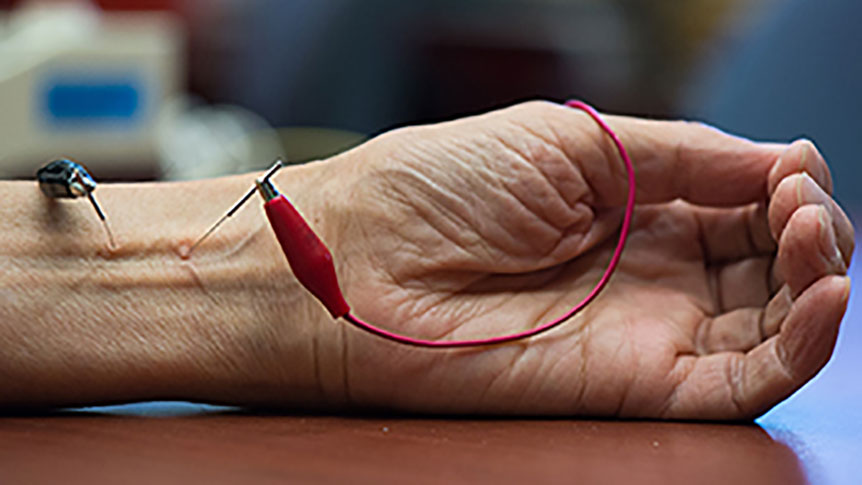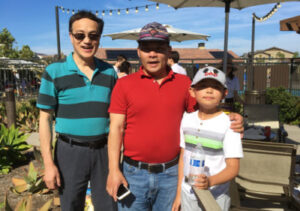UCI Brain Pilot Grant: Studying the Neural Mechanisms of Acupuncture on Cardiovascular Function

Studying the Neural Mechanisms of
Acupuncture on Cardiovascular Function
Nearly half of adults in the US suffer from cardiovascular disease, a condition that puts individuals at risk for long-term cognitive decline and even death.
Acupuncture is based on traditional Chinese medicine and has been researched extensively in numerous medical applications including various types of pain. However, its contributions to improving cardiovascular function have not been studied in detail and remain a mystery. There is a paucity of mechanistic studies using the appropriate animal models that can understand the impact of acupuncture on heart and brain function.

Dr. Shaista Malik, co-collaborator and associate vice chancellor for the Susan Samueli Integrative Health Institute, meets with a patient. Steve Zylius/UCI
An interdisciplinary team at UC Irvine was awarded a UCI Brain Pilot Grant to tackle this knowledge gap using techniques that will revolutionize our understanding of acupuncture.
“Giving mice acupuncture will allow us to objectively evaluate the effects and neural mechanisms of this alternative treatment,” explained Dr. Zhi-Ling Guo a cardiology researcher from the UCI Susan Samueli Integrative Health Institute. “We will use recent viral and genetic techniques to examine the neural circuit basis of acupuncture’s influence.”
Doctors Zhi-Ling Guo and Shaista Malik from the UCI Susan Samueli Integrative Health Institute have conducted a series of studies that show that acupuncture supports cardiovascular health. However, only recently has technology been developed that will allow the researchers to dive into how the nerves under the acupuncture point communicate with the brain and heart. Dr. Xiangmin Xu, a UCI School of Medicine researcher who specializes in neural circuit mapping, brings his extensive expertise in using novel viral and genetic tools to pinpoint how a tiny, strategically placed needle can help a patient with cardiovascular disease.

Doctors Guo and Xu pose for a photo with Dr. Xu’s son at a lab party in 2019.
“I learned about Chinese traditional medicine, including acupuncture, while I studied medicine at Shanghai Medical University in the 90’s,” explained Xu.
Though the researchers are from two separate schools on the 2.3 square mile UC Irvine campus, after beginning their collaboration they found that their labs were within a few minutes walking distance to each other. The UCI Brain Initiative pilot grant program was designed to facilitate cross-disciplinary collaboration and support proof-of-concept work like this study.
The collaborators plan to apply for larger grants from federal sponsors such as the National Institutes of Health. To be competitive, however, they will need preliminary data supporting their hypothesis. This is exactly what the pilot program is intended to fund.
“Integrative health is really whole person care that is informed by evidence,” said Dr. Shaista Malik, co-collaborator and associate vice chancellor for the Susan Samueli Integrative Health Institute. “We are committed to doing the research on why some of these therapies work and which ones don’t.”
Guo explained, “Findings from this research will address important questions in the field of acupuncture. This will be the first time anyone has studied neural circuits using these advanced viral and genetic tools that will help map acupuncture’s action in the modulation of cardiovascular function.”
